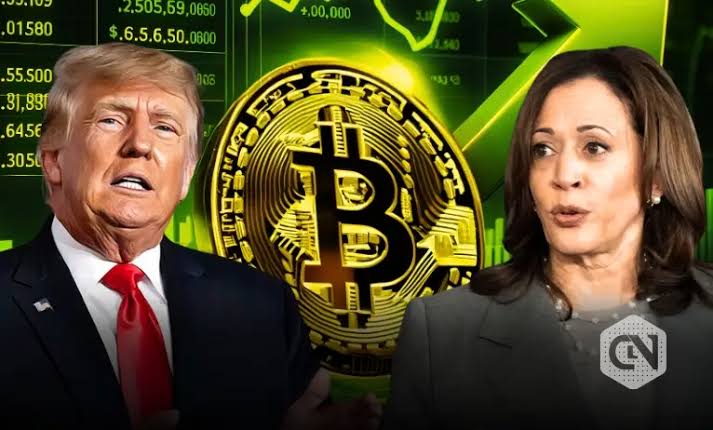Banking Sector Split on Trump’s Pro-Crypto Stance and Harris’ Tech Consumer Protections
A recent survey conducted by American Banker has revealed a surprising split among US banking professionals when it comes to the 2024 presidential election. While many within the industry favor Donald Trump’s pro-business stance, a significant majority believe that Kamala Harris will ultimately win the race for the White House. This divide underscores the growing political importance of cryptocurrency regulation, a key issue that has attracted contrasting opinions from the two candidates.
Trump Gains Support for Pro-Crypto Policies
According to the survey, 58% of bankers view Trump as the more favorable candidate for the financial sector. His shift towards a pro-crypto agenda has resonated with many professionals in the industry, especially those who are looking for more regulatory clarity in the rapidly growing cryptocurrency market.
Trump, who once criticized Bitcoin, has now rebranded himself as a supporter of digital assets, promising to make the US a global leader in the space. His administration, should he win, is expected to take a less restrictive approach to crypto regulation. He has called for the end of what he terms as an “unlawful crackdown” on cryptocurrencies, positioning himself as a champion of decentralized finance.
Harris’ Consumer Protection Focus and Tech Alignment
In contrast, Vice President Kamala Harris has emphasized the importance of consumer protections when it comes to new technologies, including cryptocurrency. Her support for emerging technologies like artificial intelligence, blockchain, and quantum computing has not gone unnoticed, but her stance on crypto remains more cautious than Trump’s.
With Silicon Valley’s backing, Harris has long been associated with tech innovation, but her focus leans more towards protecting consumers from potential risks posed by unregulated digital assets. This approach, while praised for its prudence, has not gained as much favor among banking professionals who are eager for more aggressive reforms to support the industry’s involvement in cryptocurrency.
Despite these differences, 59% of bankers surveyed believe that Harris will win the election. Her established ties to Silicon Valley and her broader tech agenda could ultimately sway voters, even if Trump enjoys stronger support from the financial sector.
Ripple CEO Predicts Crypto Reset
Ripple CEO Brad Garlinghouse weighed in on the debate, predicting that a “crypto reset” is inevitable, regardless of who wins the election. Garlinghouse, a prominent figure in the cryptocurrency industry, believes that both candidates will need to address the evolving digital economy in a more comprehensive manner.
Speaking at Washington DC Fintech Week, Garlinghouse noted that the current administration’s stance on crypto has been “hostile” but expressed optimism that a change is coming. He also commented on Trump’s pro-crypto position, saying that the former president has emerged as a vocal supporter of the industry. Meanwhile, Harris’ track record in tech offers some reassurance that her administration would not ignore the burgeoning crypto space, even if her policies prioritize consumer safety over rapid deregulation.
Political Divisions in the Crypto Sector
The survey results also highlight a growing trend within US politics: the increasing importance of cryptocurrency in election discourse. Former White House Chief of Staff Mick Mulvaney observed that crypto doesn’t fit neatly into traditional party lines, with both Republicans and Democrats expressing varied opinions on the issue. Mulvaney predicts that cryptocurrency will play an even larger role in future elections as more interest groups and political action committees back pro-crypto candidates.
This trend is already evident, with political action committees like Fairshake and Bitcoin Voter PAC funneling resources into campaigns supporting candidates who are favorable to crypto. Ripple’s Garlinghouse and co-founder Chris Larsen have also made significant contributions to pro-crypto candidates, further cementing the industry’s influence on the political landscape.
As the 2024 election approaches, the division between banking professionals on Trump and Harris reflects broader debates about the future of cryptocurrency regulation. While Trump’s pro-crypto stance has garnered significant support, Harris’ expected victory signals a more cautious approach to the industry. With key figures like Brad Garlinghouse predicting a reset, the future of crypto regulation in the US remains uncertain, regardless of the election’s outcome. However, one thing is clear: the intersection of politics and crypto is only beginning to heat up.
